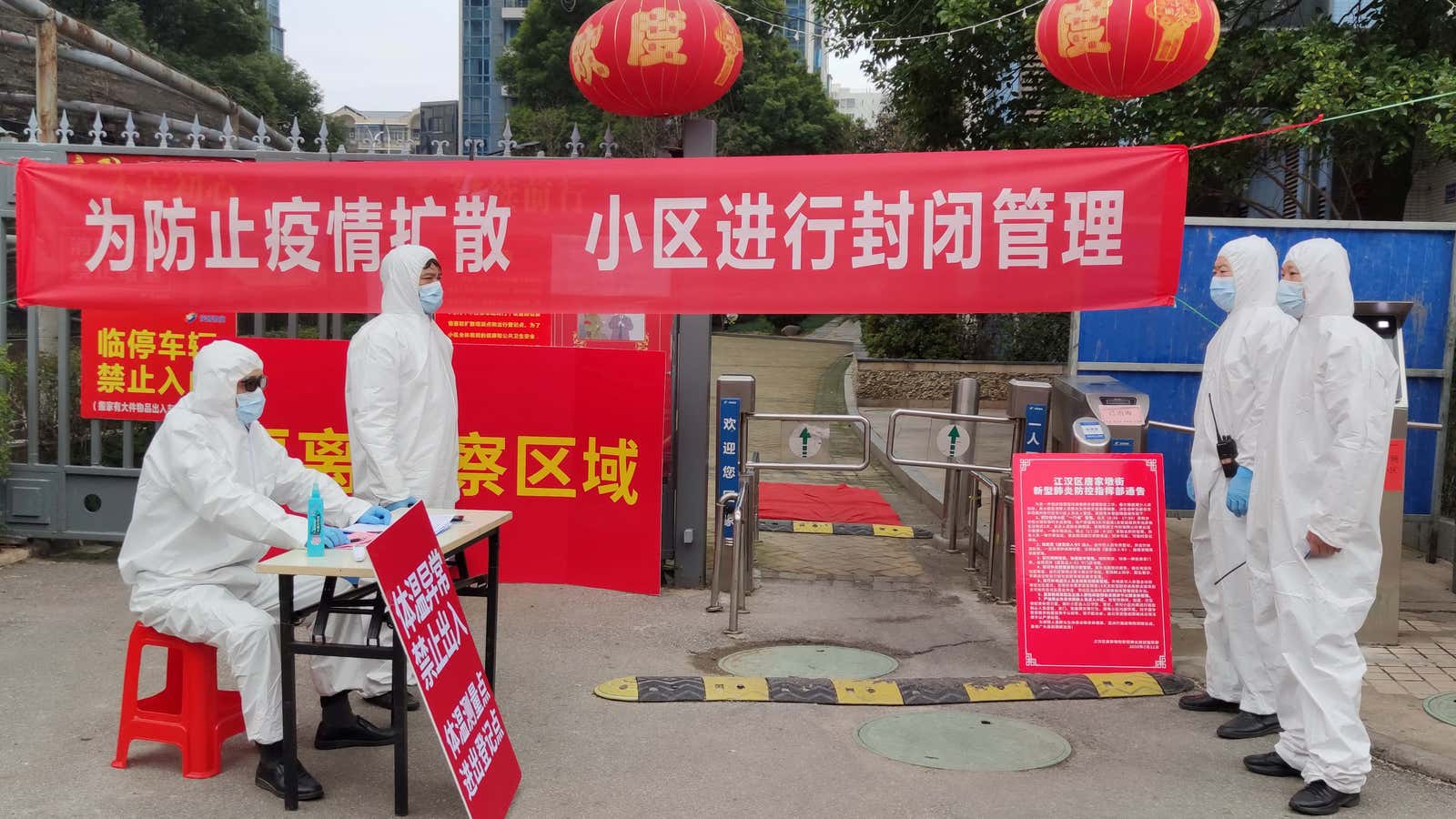“Do you still refuse to comply with the rules? Do you?” a young Chinese police officer asked a villager as he pinned him to the ground. “I comply, I comply!” the villager answered through his facemask, before being taken away in handcuffs by two officers, according to a video (link in Chinese) posted by newspaper Beijing News on Feb. 18.
The villager’s crime? Making a complaint. The video shows the policemen asking to see the villager’s travel permit at a checkpoint that had been set up as part of the coronavirus lockdown, which the villager questioned as “strange.” “What do you mean by that?” asked the officer, before pushing him to the ground.
After the video started circulating on Chinese social networks, the police station in Nanjiang county in Sichuan province where the officers worked issued a statement, saying the villager, surnamed Zhou, failed to show a valid travel permit and parked his car on the main road and blocked other vehicles. As such, the officers had to take Zhou away to “criticize and educate” him, before releasing him later. The Nanjiang police bureau said it noticed the officers’ “irrational and uncivilized” behavior and promised to punish them according to relevant police rules. One user on social network Weibo called the officers (link in Chinese) “hooligans with licenses.”
What happened to Zhou is not an isolated incident. After Chinese leader Xi Jinping called for a “people’s war” in early February against the coronavirus, not only officials and police, but ordinary community workers and security guards acting as self-styled grassroots law-enforcement agents have risen to the task with the zeal of a social crusade, performing tasks such as checking people’s temperatures and ensuring returnees from high-risk areas quarantine themselves. That’s drawn a backlash over the excessive use of power by some of these community crusaders. Some say their actions are reminiscent of the reign of late leader Mao Zedong, who mobilized the masses to achieve social and political change during his Cultural Revolution between 1966 to 1976, often through brutal measures that stripped people of basic human rights and tore apart Chinese society.
“Some of the extreme measures imposed by local authorities reflect one key characteristic of the Mao era: social control in the form of mass movements. Just as under Mao, some of the control measures were amplified when they reached grassroots levels such as villages,” said Wu Qiang, a Beijing-based political commentator.
Hubei province, the region worst-hit by Covid-19 in China, for example, has implemented “wartime” measures to fight the disease, including rounding up coronavirus patients—sometimes even healthy people—and sending them to makeshift quarantine facilities. Elsewhere in the country, millions of people have been essentially forced under house arrest—in Chongqing for example, each household is required to send only one family member every three days to purchase essential items. People in Tianjin must scan a QR code to register their movements when they enter public places, according to residents interviewed by Quartz.
In more extreme instances, videos published by Chinese news outlets have shown police barging into the house (links in Chinese) of a family that was playing mahjong and smashing their table, or slapping an elderly man in the countryside for refusing to wear a face mask. In another case, a dog in Xi’an was beaten to death by a community worker who said the actions were needed to contain the virus, after a theory that pets can spread the disease started to spread in China. A Chengdu-based newspaper cited a video where a villager in Henan province was tied to the wall by a local government worker who said he wanted to “remind the guy of the importance of wearing a mask.”
Many online said that the community volunteers in these incidents reminded them of Red Guards, the young people who enthusiastically took part in Mao’s Cultural Revolution by engaging in activities such as public humiliation of their friends, family, and teachers in order to expose their “bourgeois values.” The users noted one thing in particular that invoked that period of history: many of those coronavirus volunteers wore red armbands, like those worn by the Red Guards as a symbol of their authority. In a widely circulated video on Weibo, a community volunteer wearing a red arm band in Beijing angrily questioned a man who was wearing shorts. “Should you wear shorts in the winter? This is a special period, we need to make sure no one gets sick or a fever.” Quartz has not independently verified the authenticity of the video.
The online anger against the community coronavirus campaign hasn’t gone unnoticed by authorities. An editorial in a state media outlet published on Feb. 18 clarified that “special times require special policies, but the bottom line should still be the rule of law.” On the same day, the ministry of public security issued a notice warning police officers to avoid “excessive force and police brutality.” Days later, the justice ministry suggested establishing official channels where people could file complaints related to such incidents.
Still, recent comments by Xi, China’s most powerful leader since Mao, suggest that such measures are likely to continue. Party officials, keen to please orders from the top to fight against the disease, may feel emboldened by comments the Chinese leader made on a conference call with over 170,000 officials on Feb. 23, where he exhorted: “Our officials have performed well… but there are also some who would not act or are too afraid of taking any responsibility, who only move if there are orders from above. Such behavior will not be tolerated, and must be firmly corrected.”
